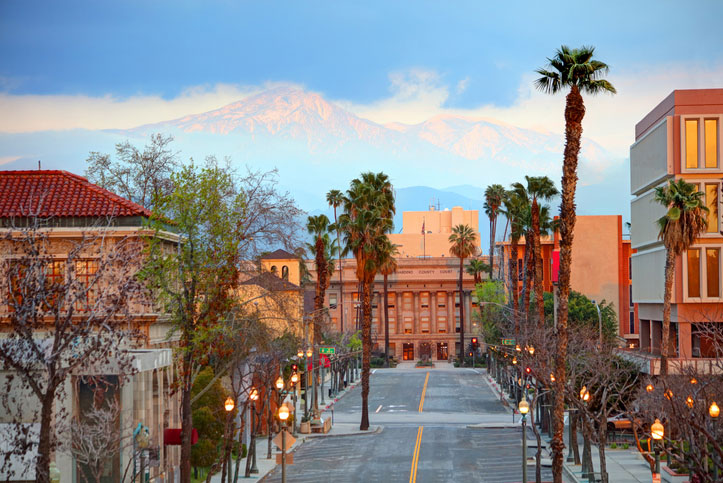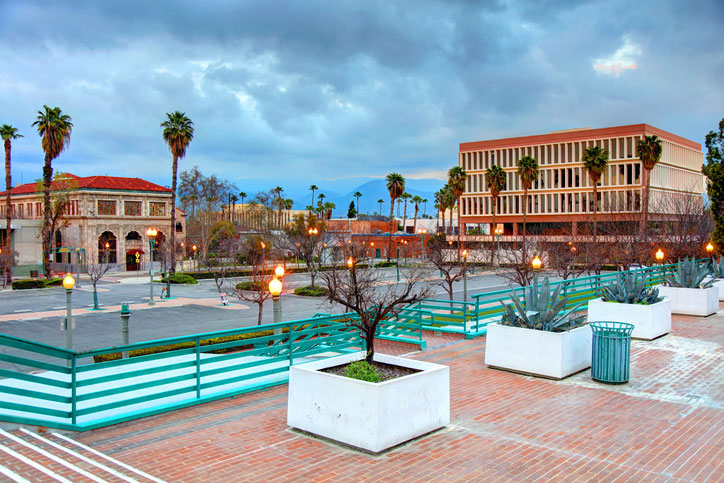Written by Helen Lewis

Qualified nurses in California can earn more than $150,000 annually, well above the national average.
Doctors of Nursing Practice (DNPs) are nurses qualified at the highest level, and are able to command some of the highest salaries available to professionals in this field. In San Bernardino, California, aspiring nurses have a couple of options available for how to pursue this lucrative and meaningful career.
The following article walks readers through the educational pathways to becoming a DNP in San Bernardino, touching on the DNP program at Loma Linda University and the non-DNP options available at California State University, San Bernardino. We’ll also touch on DNP jobs and salaries in California, as well as specializations, BSN to DNP programs, and the tuition costs associated with these degree programs.
Welcome to San Bernardino, California
San Bernardino, California, is a city with a rich and diverse history, nestled at the base of the San Bernardino Mountains in the Inland Empire region. The city’s history can be traced back to the early 19th century, with the formal establishment of the town occurring in 1852 by Mormon settlers.
San Bernardino is also home to California State University, San Bernardino (Cal State San Bernardino, or CSUSB), a university known for its diverse student body and strong programs in business, education, and the social sciences. Also in the region is San Bernardino Valley College, a local community college that serves as an important stepping stone for many residents pursuing higher education or vocational training.
Today, San Bernardino is known for its diverse community and its role as a major logistical center, thanks to its strategic location along the I-10 and I-215 highways and its proximity to the ports of Los Angeles and Long Beach. Despite facing economic challenges, particularly following the decline of its manufacturing base and its bankruptcy filing in 2012, San Bernardino continues to be a resilient community, with ongoing efforts to revitalize its downtown and improve the quality of life for its residents.
Pursuing a DNP Degree in San Bernardino, California

San Bernardino offers a supportive environment for advanced nursing education, but your options are more limited when it comes to specifically pursuing a DNP degree.
In the greater San Bernardino region, aspiring nurses’ only option for a DNP degree program is Loma Linda University. Cal State San Bernardino does not offer a DNP program, but it does offer a variety of nursing programs that can set the foundation for a DNP elsewhere.
Loma Linda University

Overview:
- Online or In-Person: Hybrid.
- Tuition: Varies by year (more below).
- Scholarships and Financial Aid: Loma Linda University offers various financial aid options, including scholarships.
- Degrees Offered: Bachelor of Science in Nursing (BSN), Master of Science in Nursing (MSN), and Doctor of Nursing Practice (DNP). Specializations within the DNP program include Family Nurse Practitioner (FNP), Nurse Anesthesia, and others.
Located just a short drive from downtown San Bernardino, Loma Linda University offers a DNP program designed to prepare nurses for the highest levels of clinical practice and leadership in healthcare, with the option of developing specializations in lucrative areas of the field.
The DNP program at Loma Linda University offers both full-time and part-time tracks, which means you can tailor your education to fit your lifestyle, whether you’re working or have other commitments.
As of summer 2024, the tuition for the DNP program is approximately $930 per unit. With the program requiring around 60-75 units (depending on your specialty and previous education), this can add up.
However, Loma Linda University offers a range of financial aid options, including scholarships, grants, and loan programs, to help manage these costs. In fact, 70-75% of nursing students at Loma Linda receive some form of financial aid.
Students also benefit from flexible payment plans. For those employed in healthcare, some workplaces offer tuition reimbursement programs. This means that while the upfront costs can be significant, there are several avenues to reduce the financial burden while earning a degree that can significantly enhance your career.
Specializations in DNP Programs: What Does That Mean?
Having “specializations within a DNP program” means that you can focus your studies in a particular area of advanced nursing practice, such as Family Nurse Practitioner (FNP), Adult-Gerontology Acute Care Nurse Practitioner (AGACNP), Nurse Anesthesia, or Psychiatric Mental Health Nurse Practitioner (PMHNP).
These specializations allow you to gain deeper expertise in a specific field, tailoring your education to match your career goals and the population you wish to serve.
Specializing within a DNP program may or may not lengthen the time it takes to complete your degree. The duration typically depends on the specific requirements of the specialization, such as the number of clinical hours and the complexity of the coursework. For example, specializations like Nurse Anesthesia often require more extensive clinical training and therefore might take longer to complete compared to other tracks.
Some specializations, like Nurse Anesthesia, tend to be more lucrative than others.
Certified Registered Nurse Anesthetists (CRNAs) are among the highest-paid nursing professionals, with salaries often significantly higher than those of other nurse practitioners.
This is due to the highly specialized skills required and the critical nature of their work.
However, you don’t necessarily have to choose a specialization within a DNP program. Some programs offer a general DNP track focusing on leadership, healthcare policy, and advanced clinical practice, without specializing in a particular area. This option might appeal to those looking for broader career opportunities or those interested in administrative or policy roles rather than direct patient care.
Non-DNP Nursing Programs in San Bernardino
Cal State San Bernardino

Overview:
- Online or In-Person: Primarily in-person, with some hybrid options available.
- Tuition: In-state tuition for undergraduates is typically around $7,500 per year. Graduate program tuition varies.
- Scholarships and Financial Aid: Scholarships and financial aid options are available, including specific opportunities for nursing students.
- Degrees Offered: Pre-Licensure Bachelor of Science in Nursing (BSN); an RN to BSN program; and a Master of Science in Nursing (MSN). They also offer post-graduate certificates in nursing specializations.
While CSUSB does not offer a DNP program, it offers a number of other degree- or certification-granting courses that may be of use to aspiring nurse practitioners in San Bernardino.
Prospective students can begin or enrich their nursing careers through programs like:
- Pre-Licensure Bachelor of Science in Nursing (BSN): Designed to prepare students who are new to nursing for national registered nurse (RN) licensure. It’s an in-person program with clinical placements at various local healthcare facilities.
- RN to BSN/Concurrent Enrollment Pathway (CEP): A hybrid program for registered nurses looking to advance their education.
- Master of Science in Nursing (MSN): Ideal for those looking to move into advanced practice roles or academic positions. Hybrid format, and includes concentrations like Nurse Educator and Advanced Community/Public Health.
- Post-Graduate Certificates: For nurses with an MSN who want to specialize further, these certificates focus on areas like Nurse Educator and Public Health.
- Non-Degree Programs: These include options like the Foreign Trained Nurse program and the LVN 30 Unit Option, designed to meet specific licensure requirements in California.
CSUSB is known for being relatively affordable compared to other universities. While tuition varies depending on the level of the program and the number of units a student takes, the tuition for undergraduate full-time enrollment (6.1 or more units) is approximately $3,848 per semester, including mandatory campus fees.
Graduate students, including those enrolled in the nursing programs, can expect to pay around $4,565 per semester for full-time enrollment. Non-resident and international students pay an additional $396 per unit. CSUSB also offers various financial aid options, including scholarships and fee waivers, to help students manage the cost of their education.
What Are BSN to DNP Programs?
BSN to DNP programs are designed for registered nurses who hold a BSN and are looking to advance their education directly to the doctoral level. Instead of first earning a Master of Science in Nursing (MSN) and then a DNP, these programs streamline the process by allowing you to move straight from a BSN to a DNP. This path is particularly appealing if you’re aiming to take on leadership roles, advanced clinical positions, or even academic roles in the future.
For nurses in San Bernardino, this pathway could be an efficient way to achieve your career goals without the extra time and cost of a separate MSN program.
After earning your BSN at CSUSB, for example, you could apply to BSN to DNP programs at institutions like Loma Linda University.
These programs typically offer specializations such as Nurse Practitioner (NP), Clinical Nurse Specialist (CNS), and Nurse Anesthetist, which are in high demand in the healthcare field and can come with higher salaries.
In essence, BSN to DNP programs are designed to fast-track your education while still providing the in-depth knowledge and clinical skills necessary to excel in advanced practice nursing.
DNP Jobs and Salaries in San Bernardino, California

In San Bernardino, as in many parts of California, DNPs can expect to find a variety of opportunities in both clinical and administrative roles. These roles include Nurse Practitioners (NPs), Clinical Nurse Specialists (CNS), Nurse Administrators, and Nursing Faculty positions. San Bernardino’s healthcare facilities, which include hospitals, clinics, and educational institutions, are continuously in need of highly trained nurses to address the region’s diverse and growing population.
As of May 2023, data from the U.S. Bureau of Labor Statistics (BLS) indicates that Nurse Practitioners in California, which includes those with a DNP, have a median annual salary of approximately $151,830.
This is significantly higher than the national average, reflecting California’s high cost of living and the demand for advanced nursing professionals in the state. Nurse Administrators and Educators also earn competitive salaries, often ranging from $120,000 to $150,000 annually depending on experience and specific roles.
2023 US Bureau of Labor Statistics salary and employment figures for Social Workers reflect state data, not school-specific information. Conditions in your area may vary. Data accessed August 2024.
